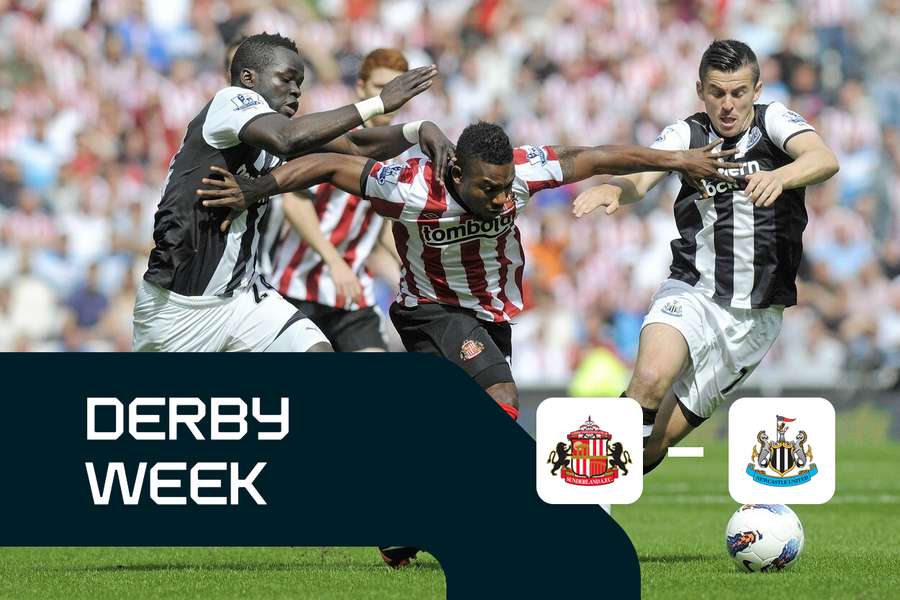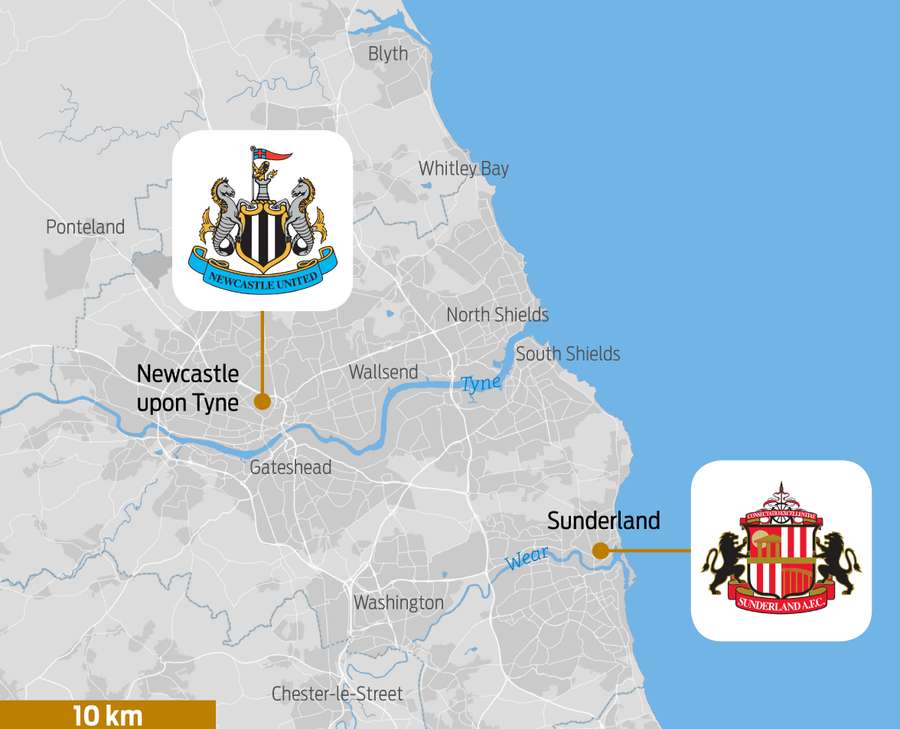Derby Week: The Tyne-Wear derby returns with its deep-rooted history and animosity

While all of Newcastle sided with the royal crown, Sunderland and its inhabitants were Parliamentarians. The two cities, just 19 kilometres apart, have been in opposition ever since, including during the Brexit vote. Consequently, the rivalry between the two cities has inevitably spilt over onto the football pitch. And this weekend, the great rivals from the north of England are meeting again after seven long years.
In the north-east of England, the county of Tyne and Wear was one of the epicentres of the Industrial Revolution in the 18th century. The local coal reserves were exploited and mines grew like mushrooms in the countryside. The railway network expanded rapidly while the region also became one of the world's most important producers of glass.
Railways led to major ports from where coal and other products of local industry were exported around the world. In the 19th century, shipbuilding emerged as a major industry in the development of Newcastle upon Tyne (abbreviated as Newcastle) and Sunderland. As well as heavy industry, the area was also a centre of innovation and new inventions.

Well, before the end of the 19th century, football also began to develop in Tyne and Wear. The biggest and most famous clubs from both cities - Sunderland AFC and Newcastle United - were formed in the 1870s. Moreover, both were amongst the elite of English football in the first historical phase of English football (which we could define as the period from the formation of the league in 1888 to the start of the First World War).
In 1892, Sunderland became only the third team to be crowned champions of England (after Preston North End's two triumphs in the first two league editions and Everton's title in 1891). Subsequently, they even defended their championship, with further titles added to the collection in 1895, 1902 and 1913.
At that time, neighbouring Newcastle also had a few league crowns: three in total. They clinched championship titles in 1905, 1907 and 1909. Both clubs then won the English top flight once more, with Newcastle winning their fourth and last title in 1927. Sunderland won the league six times, most recently in 1936.
The successes of both teams from nearby cities in the north of England have naturally fuelled intense sporting competition. However, there are other aspects to the Sunderland-Newcastle rivalry that are much older than football itself.
On the knife - literally
Before the English Civil War (which lasted between 1642 and 1651), King Charles I granted the city of Newcastle the rights to mine coal. This had a major impact on neighbouring Sunderland, where the coal trade was also booming. But suddenly it was stopped. The King's move naturally caused resentment in the city towards the privileged Newcastle and the monarchy as a whole. From the beginning of the Civil War, predominantly Protestant Sunderland sided with the Parliamentarians.
This was in direct opposition to the Catholic Royalists in Newcastle. Tens of thousands of men were killed in battles between the Parliamentarians and the Royalists after King Charles I was executed in 1649. The Civil War, in which England, Scotland and Ireland lost up to a tenth of their entire populations (not only in combat but mainly as a result of epidemics of various diseases), ended with the Parliamentarian victory at the Battle of Worcester in 1651.
The country then returned to the monarchy in a complicated way. Even during the Jacobite Rebellion, which convulsed Britain from the late 17th century until the mid-18th century, the cities of Newcastle and Sunderland were pitted against each other. It continued later into British history - even the results of the 2016 Brexit vote (the United Kingdom's withdrawal from the European Union) turned out differently in the two cities.
While Sunderland (like the rest of the North East of England) was the centre of the Vote Leave movement, Newcastle shines as a lonely island in the map of election results, where a majority (albeit a narrow one) ticked the Remain option to stay in the European Union. Newcastle and Sunderland will probably be in political and opinion opposition for ever.
All the more reason why the football matches between the two cities' football teams, the so-called Tyne-Wear derby, named after the rivers on which the cities lie, is gaining momentum.
Sunderland 'Til I Die versus Saudi money
The North East of England has been transformed from the country's rich industrial centre into a troubled periphery over the last century and a half. The county of Tyne and Wear has lost much of its wealth. Famous shipyards, docks, traditional glassworks and coal mines have gradually closed. The football heritage has also suffered.
When Newcastle and Sunderland's footballers drew 1-1 in the Premier League in March 2016, no one would have guessed that it would be the last Tyne-Wear derby until this weekend.
Both clubs then fell into the darkest period in their history. Newcastle were relegated in 2016. It did return to the elite immediately after a year, but it languished there for a long time and, more importantly, the club dealt with existential uncertainty as controversial owner Mike Ashley repeatedly (and unsuccessfully) tried to get rid of it.
That Sunderland met a fate even blacker than befits even the Black Cats (as Sunderland footballers are nicknamed) is surely well known to you from the Netflix documentary series Sunderland 'Til I Die.
If you haven't seen the series, be sure to do so. The documentary chronicles the club's fall to League One, in which Sunderland spent four seasons before fighting their way back "at least" to the Championship in 2022.
Newcastle United, meanwhile, managed to find a new owner. In April 2020, it was first reported that a powerful Saudi Arabian investment group was going to buy the club. There was talk of Newcastle United becoming the next Manchester City or Paris Saint-Germain, a club with almost unlimited capital.
After many years of hardship with Ashley, Newcastle fans felt hopeful that their beloved Magpies (the nickname of the team's footballers) would be able to spread their wings again.
The Saudis also won fans over by promising to invest in the whole city and nearby area, creating jobs (this is a region with almost the highest unemployment rate in England). However, a number of uncertainties and problems began to surface around the potential buyer.
The sale of the club, which took over a year to complete, to the even more controversial but fabulously wealthy Saudi owners, was finally completed in October 2021, making Newcastle United the richest club in the world.
The long wait for the Tyne-Wear derby will come to an end on Saturday January 6th at 13:45 CET when Sunderland and Newcastle clash in the famous FA Cup. The derby will be all the more prestigious because the record of the two rivals is perfectly balanced: 53 wins for Newcastle, the same number of victories for Sunderland and 50 draws.
Will Sunderland's Black Cats or Newcastle's Magpies capture the prized scalp for their city? Football in the north of England is picking up again and tensions are starting to rise between the region's two biggest clubs.
You can read more about the Tyne-Wear derby and other rivalries in English football in the book More than just a match - football derbies in England, which has the same author as the Derby Week column.
Other derbies of the week
Friday January 5th
Portugal - Primeira Liga
About Derbi do Porto
Portuguese football is ruled by the 'Big Three'. Historically, every edition of the local league has been won by one of the trio of Benfica, Sporting and Porto. With only two exceptions. One of these is the title of the smaller of the two Porto clubs, Boavista, in 2001. The Porto derby is a David and Goliath battle with all the trimmings.
Saturday January 6th
O Derbi do Minho
Braga and Guimaraes are the two largest cities of the Minho region in the north of Portugal. They are only 20 kilometres apart and are rivals from a historical point of view. The rivalry between them carries over onto the football pitch. Moreover, both derby protagonists are very successful clubs by Portuguese standards.
Sunday January 7th
France - Coupe de France
Le Celtico
In the French Cup, second league Guingamp will face Rennes, who play in the top flight of Ligue 1. The two towns are located 130 kilometres apart in the west of France in Brittany, known as the land of the Celts - the local derby is named after this historic nation.
Derby de Normandie
Los Coupe de France also sent two other regional rivals against each other. In the Normandy Derby, a first division side from the port city of Le Havre will face off against a team from Caen, which lies about an hour south, to reach the eighth round. SM Caen currently play in the second highest competition.
Greece - Super League
Aris Thessaloniki - PAOK Thessaloniki
Thessaloniki derby
Greek football is currently facing a huge problem. Due to a series of stadium violence, the Greek government closed stadiums in December. The game will be played without spectators until 12 February. Unfortunately, the Thessaloniki derby will also take place without spectators. PAOK are on a five-match unbeaten run.
Spain - Copa del Rey
Derbi Canario
The Spanish Royal Cup has an eight-final round on the schedule. It will feature a derby between the two biggest teams from the two most populous Canary Islands. The island with the largest population is Tenerife. Las Palmas from Gran Canaria are currently playing in LaLiga.



